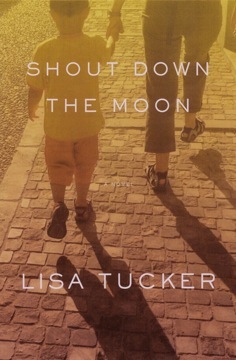

Q. Speaking of Willie, He's only two years old, yet he's a full-fledged character in his own right. Was it difficult to write a child?
A. Oh, I enjoyed every minute with Willie. He's one of my favorite characters, and the scene with him in the park was my favorite scene to write. I wanted to make him a strong presence in the novel because he's such a presence in Patty's mind -- and the story is told entirely from her point of view. Patty is always aware of where Willie is, what he needs, what he feels, and this awareness is what keeps her connected to the present, even when her past most threatens to overwhelm her.
Q. Shout Down The Moon is literary fiction, but undeniably suspenseful. Did you set out to write a suspense novel?
A. No, but I'm always pleased when people tell me they couldn't stop turning the pages. I remember something I heard in graduate school about Thomas Hardy, that he supposedly asked only one question of his readers: "Did it hold your interest?" I love this because it expresses so well what I think the first job of the novelist is -- to keep the reader in the story.
My books always seem to start at the same place: with a character in trouble. In Patty's case, a big part of the trouble was Rick, and Rick involved her in a very dark world. But what's unusual, I think, is that here the criminal's girlfriend is telling her own story. Patty is making us know her as more than her involvement with Rick: as a mother and a singer and a woman finding her voice.
Q. Your first novel, The Song Reader, is also about music and motherhood. Why did you return to these themes?
A. I think of The Song Reader as about what music mean to listeners, and Shout Down The Moon as about what it means to performers. A subtle difference, especially as Patty was a listener before she was a singer, and even at the end of the novel, it's when she hears songs playing in her mind that she is reminded she can escape from Rick, she can live a better life. In both books, a child is the motivation for a woman to find a place for herself in the world. Music is my passion, and being a mother is the most important thing I've ever done.
Q. Another common theme in these novels is the desire for stability and home. Both Leann [the narrator of The Song Reader] and Patty talk in poignant terms about the "normal" life that they feel is always just beyond their grasp.
A. There are so many novels about a character who rebels against his family and leaves home to find himself. It's a great story, but what if you don't have a family that's stable enough to rebel against? How can you run away from a home that you don't have? Both Leann and Patty are people on the margins of society, and their dream of stability is very understandable, though I think they also find that their experiences help redefine what normal means. They do achieve an oddly stable "family," even if it isn't the traditional kind.
Q. Who do you see as your audience? Do you imagine a reader as you're writing? Do you show anyone your early drafts?
A. This may sound odd, but the only people I consider while I'm writing are the characters. I almost feel as if they are reading over my shoulder, making sure I tell their story honestly, keeping me from any tricks or gimmicks or "writerly" moments that would be about me and not them. When I begin the editing process, I do think about that audience -- not a particular audience, because I hope my books can be read by women and men, teens and older people, anybody and everybody -- but the general notion of someone outside of the story who has to be brought in and convinced to stay in this world until the last sentence.
Q. Can you tell us what you're working on now?
A. I've just finished a story for an anthology of original stories inspired by songs called Lit Riffs. Each writer had to pick a song; I picked a piece from Pearl Jam's first album, "Why Go." I love jazz, but I also like rock and classical and even a lot of pop music. (Unlike Jonathan, I believe something can be popular and still good.) I'm also writing another novel that will be published by Pocket Books, probably in 2005. The working title is What a Difference a Day Made. It's about the way a heart can be broken by the tragic events of a single day, yet a single day can also bring a new chance at love and the possibility of redemption. It's been very interesting to write because it has a larger cast of characters, three locations (New Mexico, California, and Missouri), and two distinct time-periods: the late seventies and the present. There is a subplot about what music means to one of the characters. I can't imagine writing a book without something about music.
Shout Down the Moon
Q&A
Q. You've traveled with a band yourself. Is the novel autobiographical?
A. I did travel with my husband's band when we were first together. We went across the Midwest and the South, playing little clubs and hotels, and even staying in trailers. Once we had to sneak out in the middle of the night because the club owner refused to pay our hotel bill. Not fun. I incorporated some of these experiences in the novel, but the story itself is fiction. I have a son but he was born later, after we had settled down. The road is such a hard life; I don't know if I could have done it with a child, the way Patty does.
Q. Patty is an incredibly brave character. Did you know all the difficulties she would face when you started the book?
A. No, and actually, I'm very resistant to making any of my characters suffer. Sometimes I find myself unable to write for days when I realize something bad is about to happen to one of the people in my books. Of course you have to let these things happen or you don't have a story. You have to let the plot go in whatever direction it wants to go, even if that means your characters will go through tragedy. In Patty's case, I was fairly confident that she would figure her way out of the mess she was presented with. I knew her love for Willie was a powerful force she could draw upon to free herself from all the darkness in her life.








